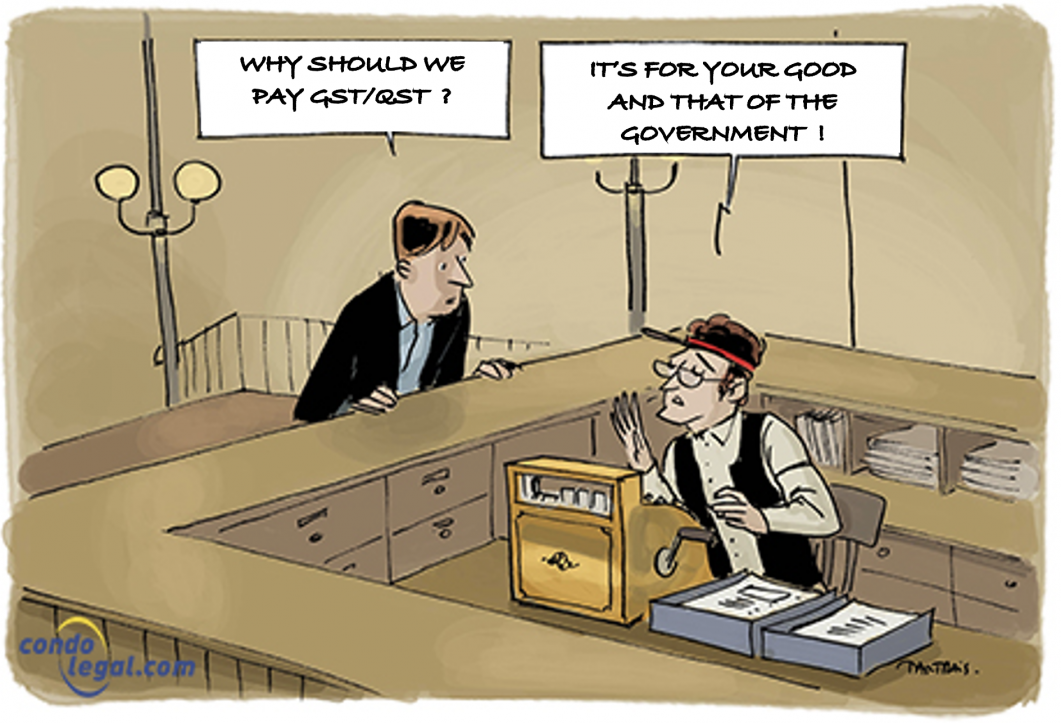 The Goods and Services Tax (GST) and the Quebec Sales Tax (QST) are collected in Quebec on the sale of most goods and services. The application of the Excise Tax Act (Part IX) and the Act respecting the Québec sales tax in respect of expenses incurred by a syndicate of co-owners and the contributions to common expenses it receives from co-owners is a very complex subject. Before registering for the GST and QST files, a syndicate of co-owners has every interest in consulting a tax professional. That said, the question remains: in what situation must a syndicate of co-owners charge GST and QST to a co-owner on his common expenses (condo fees)?
The Goods and Services Tax (GST) and the Quebec Sales Tax (QST) are collected in Quebec on the sale of most goods and services. The application of the Excise Tax Act (Part IX) and the Act respecting the Québec sales tax in respect of expenses incurred by a syndicate of co-owners and the contributions to common expenses it receives from co-owners is a very complex subject. Before registering for the GST and QST files, a syndicate of co-owners has every interest in consulting a tax professional. That said, the question remains: in what situation must a syndicate of co-owners charge GST and QST to a co-owner on his common expenses (condo fees)?
Tax exemption
It should be noted that when the syndicate charges common expenses to co-owners whose destination of their private portion is residential, it makes supplies that are exempt from taxes. However, it may be otherwise for a co-ownership whose destination is partly or entirely commercial or hotel (resort).
Registration of the syndicate of co-owners in the GST and QST files
A syndicate must register and invoice these taxes to the co-owners when the two conditions set out below are met:
In the event that the common expenses collected by the syndicate of co-owners are less than $50,000, the syndicate can choose whether or not to register (small supplier status).
As a general rule, common expenses are taxable when a fraction (residential unit) is used for commercial purposes (e.g. pharmacy, store). Some residential co-owners who are short-term rentals could also be considered commercial residential unit operators. Indeed, if the fraction is not used mainly (more than 50% of the time) as a place of residence, and it is rented in whole or almost (90% of the time or more) for periods not exceeding 60 days, then the residential unit will be considered a commercial enterprise. We only have to think of co-owners who engage in hotel type rentals (e.g. Airbnb ® or Home Away) for less than 60 days/rental.
That said, it is not always easy to decide that a co-owner is renting subject to GST and QST. This seems obvious for a commercial co-owner with a storefront, but the exercise is more difficult in the case of people who rent their unit more than 50% of the time, and almost entirely for periods not exceeding 60 days. Moreover, very often, the co-owners who correspond to this profile do not appear publicly.
Directors' Liability
It is recognized that the administrator of a legal person may be held liable for the tax and the related interest and penalties for failure to remit the GST and/or QST at the prescribed time (sections 24.0.1 et seq. of the Tax Administration Act for the QST and section 323 of Part IX of the Excise Tax Act for the GST). In order to limit the liability of the directors of a syndicate of co-owners, they should send the co-owners a questionnaire asking them if they are subject to the GST and/or the QST. This procedure shows that they act with prudence and diligence, it being understood that it is the responsibility of the co-owners to inform the syndicate whether they operate a commercial activity.
Benefits
The question arises as to whether there is a disadvantage for a co-owner whose unit’s purpose is commercial to have the GST and QST added to his common expenses. Yes, if the co-owner is not registered for the GST and QST, he will not be able to claim an input tax credit, that is, the refund of the tax on purchases he has made. The tax will then be part of its operating costs. On the other hand, if the same co-owner is registered for tax because of the nature of his activities, he will be able to claim the GST and QST (on his common expenses) as an input, although he must pay it to his syndicate, so that the effect will be zero for him.
However, the registration of a syndicate of co-owners to the tax can be advantageous. Once registered, the syndicate will have to charge the GST and QST to its commercial co-owners, and in return, the syndicate will be entitled to a rebate (input tax credit), based on the share paid in common expenses by the owners of commercial residential units. For example, if the syndicate paid an amount of $20,000 in GST and QST during a given tax period, and 50% of the co-owners were engaged in commercial activities there, the syndicate will be entitled to a tax refund equivalent to $10,000. The syndicate will be entitled to this reimbursement since its building includes commercial residential units. He will therefore have to grant a reduction in common charges accordingly to those who own commercial housing units, as they are the ones who allowed the syndicate to recover the tax.
 WHAT YOU SHOULD KNOW ! A syndicate of co-owners is generally recognized, from a tax point of view, as a not-for-profit corporation. As such, it is a small supplier if the total amount of any revenue (before deduction of expenses) from your global taxable supplies arising from all of the organization's activities does not exceed $50,000 in a single quarter and in the last four consecutive calendar quarters. He can then choose whether to register for the GST and QST.
WHAT YOU SHOULD KNOW ! A syndicate of co-owners is generally recognized, from a tax point of view, as a not-for-profit corporation. As such, it is a small supplier if the total amount of any revenue (before deduction of expenses) from your global taxable supplies arising from all of the organization's activities does not exceed $50,000 in a single quarter and in the last four consecutive calendar quarters. He can then choose whether to register for the GST and QST.
 WHAT TO KEEP IN MIND : For the purposes of the GST and QST, a syndicate of co-owners is a legal person distinct from the co-owners who are members of the syndicate. Thus, he does not act as agent of the co-owners, but acts on his own behalf, when he acquires goods and services relating to the conservation, maintenance and administration of the common elements.
WHAT TO KEEP IN MIND : For the purposes of the GST and QST, a syndicate of co-owners is a legal person distinct from the co-owners who are members of the syndicate. Thus, he does not act as agent of the co-owners, but acts on his own behalf, when he acquires goods and services relating to the conservation, maintenance and administration of the common elements.
 WARNING ! Input tax credits should be remitted to co-owners who are registered for the GST and QST those who have benefited the syndicate. It is a principle of fairness.
WARNING ! Input tax credits should be remitted to co-owners who are registered for the GST and QST those who have benefited the syndicate. It is a principle of fairness.
Thank you to Me Yves Joli-Coeur, lawyer and president of the RGCQ, for his contribution to this column with regard to the legal aspects.
Aline Desormeaux, CPA auditrice, CA
Désormeaux Patenaude inc
1312 Sherbrooke est
Montréal, Québec H2L 1M2
Téléphone : 514 522-2232 EXT. 207
[email protected]
Chronic express the personal opinions of the author and in no way engage the responsibility of the site editor, CondoLegal.com Inc. The content and opinions expressed in a column are those of the author.



